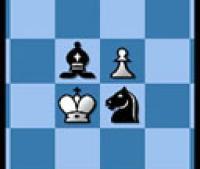
Practical Chess: Novice Nook
Some chess players have a chess coach. The really lucky players have a good coach. What about the rest of us?
Well, there is a ton of material out there from which to study: books, magazines, videos, software, websites, and so on. So, just pick one, and get on with it, yeah?
I have never had a chess coach, so I can’t claim to know the benefits of such a relationship. However, I’ve had many music instructors in my time, and some of them were excellent teachers. When studying a musical instrument most instructors are at least competent enough to evaluate the student’s skill and correct mistakes. While this sort of thing is helpful, it’s not really the best use of a student’s time. The really good teachers direct the student’s study by promoting a study schedule that will improve the student’s knowledge and skill with the least amount of time and effort. Essentially, this amounts to efficient study of the instrument.
I’m sure this is true of chess as well. An undirected student of chess is likely to pick whatever course of study that seems “cool” and then dig in in for the duration. No doubt any acquisition of relevant knowledge will benefit the student, but semi-random choices of study material is hardly an efficient method of study. We all want to get better as quickly as humanly possible, right?
Right.
So, all of us beginners need a roadmap to efficiency, and I have some answers for your consideration. A common theme is that beginner’s games are generally won or lost on tactics, and that by studying tactics beginners will see the most improvement their games. Although this is probably true, it is not specific enough to be much help. "Learning tactics" is too much of a generalization for it to be useful advice, and I don’t think that spending all your time on the Tactics Trainer is sufficient. The Tactics Trainer, and similar software, is a great way to practice, but not for learning new material.
We need to find more precise help, some candidate lines of beginner’s study. On that note I present to you Dan Heisman’s excellent web column, Novice Nook, published at ChessCafe.com.
Within the pages of Novice Nook you will find a diverse set of material that is entirely focused on chess study for beginners. These articles are well written and are bent on the practical. No fuzzy logic within these articles; everything is very concrete. You will never finish reading one of these articles and be confused about what you are supposed to be learning from Heisman.
It’s difficult to give specific examples because all the Novice Nook articles are so good! That fact not withstanding, I’ll point you to the latest article to give you an idea of what Novice Nook is all about: The Safety Table. Come on back when you are finished reading. I’ll wait.
If you liked that article you are going to love the rest of them, and they are all available in the Chess Cafe archives. All of the archived articles are in PDF and you can choose to view them one at a time, or you can download big year-by-year batches of articles for offline reading.
Dan Heisman’s work is by no means the only chess-coach-by-proxy available to all of us coachless chess players, but that’s for another article. Besides, there’s so much useful information in Novice Nook, you won’t be needing any pointers to similar material for quite a while, methinks.
As always, I’m Stick, and I’ll see y’all out there on the gridiron!






